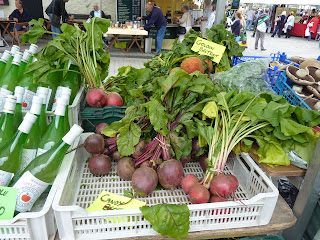Conditionals are sentence structures that explain a particular situation or circumstance and its consequences.
If this happens, then that happens.
Conditionals often contain the word 'if'.
There are four main conditionals that are commonly used in the English language:
first conditional, second conditional, third conditional and zero conditional.
The first Conditional
The first conditional deals with issues that have a real possibility of occurring.
If it is sunny, then we shall go to the market.
Wells Farmer's Market
 |
| If she sells a lot of cheese, she may go home early. |
 |
| If he sells his cheese he will go for a pint |
 |
| If the customer buys some bread, she can make some sandwiches. |
The Second Conditional
The second conditional is a bit more tricky.
In some ways it is similar to the first conditional. It uses the same if / then structure, but instead of using the words will, shall, may or can, the second conditional uses would, could or might.
The most significant difference between the second conditional and the first conditional, however, is that the second conditional deals with events that are not real possibilities. In many cases, the events could happen; they are not physical impossibilities. However, they are not tangible events that are certain to impact on daily life.
The second conditional is what English speakers use when they are dreaming or fantasizing about something.
For example
For example
 |
| If I had a market stall, I would sell fruit and veg. |
 |
| If I owned this stall, I could sell jam. |
 |
| If I was a spice seller I might sell cumin. |
 |
| If I had studied photography at school I would have taken better photos. |
The Third Conditional
While the first two conditionals talk about possible future events, the third conditional deals with the past. Specifically, the third conditional talks about events in the past and ponders the effects of those events not happening. Because we cannot go back in time, the third conditional deals with events that have no possibility of happening. The third conditional uses the words would have to convey these impossible event
If I had inherited the farm, I would have grown some vegetables. |
If I had been able to read the label, I would have known what these vegetables were called. |
Zero Conditional
The zero conditional deals with issues that are always true.
They can often be thought of as a scientific fact.
 |
| If you ask for Granny Smiths, you'll get the green apples. |
 |
| If you visit Wells Farmer's Market on Wednesdays, you'll see the Town Crier. |
 |
| If you visit the National Trust shop you will see lots of flowers. |
 |
| If you go through the Penniless Porch, you will see buskers. |



No comments:
Post a Comment